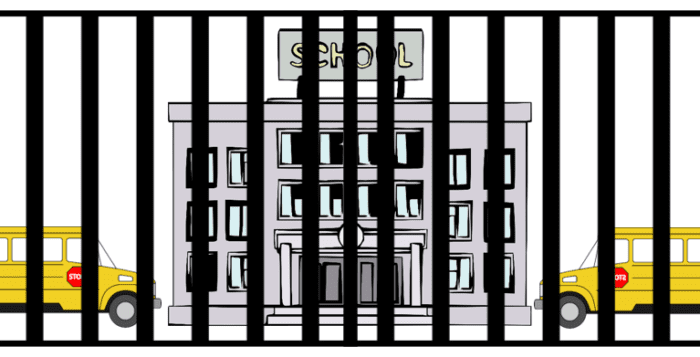Making Democracy Work: Deconstructing the school to prison pipeline
By Nancy Marr
Concern about the school to prison pipeline has mounted in recent years. At the opening of the first federal hearing on the subject, earlier this year, Sen. Dick Durbin (D-IL) said, “For many young people, our schools are increasingly a gateway to the criminal justice system. This phenomenon is a consequence of a culture of zero tolerance that is widespread in our schools and is depriving many children of their fundamental right to an education.”
Matthew Cregot, an attorney with the NAACP Legal Defense Fund, explained, “With suspension a top predictor of dropout, we must confront this practice if we are ever to end the ‘dropout crisis,’ or the so-called achievement gap.”
A zero-tolerance policy requires school officials to hand down specific, consistent and harsh punishment — usually suspension or expulsion — when students break certain rules. The punishment applies regardless of the circumstances, the reasons for the behavior (like self-defense) or the student’s history of discipline problems.
These policies developed in the 1990s in response to school shootings and general fears about crime. The school to prison pipeline starts (or is best avoided) in the classroom. When combined with zero-tolerance policies, a teacher’s decision to refer students for punishment can mean they are pushed out of the classroom, and much more likely to be headed toward the criminal justice system.
On May 10, Suffolk County Sheriff Errol D. Toulon Jr. (D) and Assemblywoman Kimberly Jean-Pierre (D-Wheatley Heights) from Babylon brought together experts in juvenile justice, child development, human services, law and trauma to develop A Holistic Approach to Deconstructing the Prison Pipeline.
Testimony at the hearing identified domestic abuse, substance abuse, mental health issues, lack of education and gangs as factors that lead young people into crime, and called for the creation of “safe spaces” for “at-risk” children to receive counseling, recreational activities, job training and education.
Intervention to help a child must recognize that he may be calling out for help, angry at himself and his environment; instead, what he gets is punishment. Significantly, three previously incarcerated women testified that prison had rescued them. It changed their environment by providing for their basic needs, making them follow rules, requiring them to go to school.
Jerri Katzerman, deputy legal director of the Southern Poverty Law Center, said that the increase in police in school buildings, called school resource officers, has contributed to the increase in in-school arrests. The vast majority of these arrests are for nonviolent offenses, often for being disruptive.
A recent U.S. Department of Education study found that more than 70 percent of students arrested in school-related incidents or referred to law enforcement are black or Hispanic. Children with special needs are also arrested at a higher rate than others. Instead of pushing children out, Katzerman said, teachers need a lot more support and training for effective discipline, and schools need to use best practices of behavior modification to keep these kids in school where they belong.
In restorative justice circles, which bring together the student who has committed the crime with the victims and any others who are affected, it is possible to repair the harm, restore relationships and help the student become accountable for his actions.
Parent groups have successfully worked with school districts to change zero-tolerance policies and adopt schoolwide positive behavior support systems that create a more welcoming environment for children and their parents, encouraging parents to advocate effectively for their children in suspension cases. These are societal issues that will not be solved solely within schools. We need to take action to create a society that meets the needs of all children.
“Deconstructing the prison pipeline is about mobilizing all facets of the community to prevent juvenile delinquency and crime,” said Toulon. “It’s about implementing practical prevention and intervention solutions that will improve people’s lives and make our communities safer.”
You can support programs in your school or community that work for all children, but especially those who need help to overcome the trauma of family problems or mental illness.
Nancy Marr is first vice president of the League of Women Voters of Suffolk County, a nonprofit, nonpartisan organization that encourages the informed and active participation of citizens in government and influences public policy through education and advocacy. For more information, visit www.lwv-suffolkcounty.org or call 631-862-6860.







